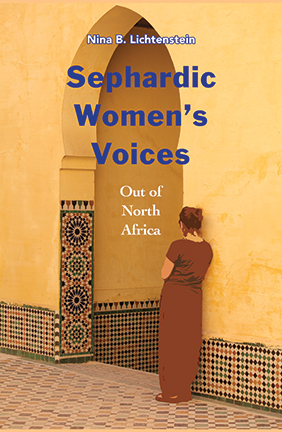Sephardic Women's Voices
Nina B. Lichtenstein
"All the authors included in this study express at some point in their writing an awareness and sorrow for not being able to visit their ancestors’ graves, or live near the final resting place of a loved one. A sense of having been forced to leave behind crucial emotional links to their past such as these may indeed be one of the central catalysts for turning to writing. Nine Moati, Gisèle Halimi, Annie Cohen, Chochana Boukobzha, Paule Darmon, Annie Fitoussie and finally Hélène Cixous all find great inspiration in inscribing their relatives’ pasts into their own life-work and thus being able to elaborate and define their own identity as linked to their North African ancestors." -- Nina B. Lichtenstein
Also available at local bookstores
This is a groundbreaking work which brings to the attention of the English-reading public the important creative work of Jewish women authors of North African origin in France since decolonization. Nina Lichtenstein masterfully provides valuable historical background and cultural contextualization together with insightful literary analysis. Her engaging and often lyric style is at once both intimately conversational and academically intellectual.
— Norman A. Stillman, Schusterman-Josey Professor of Judaic History Emeritus, University of Oklahoma. Author of The Jews of Arab Lands and Jews in Arab Lands in Modern Times.
Nina Lichtenstein’s book should be required reading in all Modern Jewish History courses because it fills the gap created by our almost exclusive emphasis on Ashkenazi history...A masterpiece!
— Shulamit Reinharz, Jacob Potofsky Professor of Sociology and Founder/Director Hadassah-Brandeis Institute and the Women’s Studies Research Center, Brandeis University. Author of One Hundred Years of Kibbutz Life and twelve other books.
Engaging issues of exodus, marginality, memory and identity, she uncovers historical and fictional worlds for the English-speaking reader...A timely and necessary work.
— Edna Aizenberg, Professor Emeritus of Hispanic Studies, Marymount Manhattan College. Coeditor of Contemporary Sephardic Identity in the Americas.
The Jewish women’s voices we hear in this book, full of sensitive insights and delicate analysis, offer a staggering array of hybrid memories of migrations, displacements, and exiles from North Africa.
— Yolande Cohen, FRSC (fellow of the Royal Society of Canada) Historian, Université du Québec, Montréal, Canada, author of Femmes Philanthropes.
It is almost a miracle that the voices of Sephardi Jews can still be heard today, having been rendered inaudible, with the passage of time, by colonizers, Maghreb or Mashreq nationalists, Ashkenazi Jews and French supporters of republican integration…Nina B. Lichtenstein has done this with talent and sensitivity. — Karim Miské, director of Jews and Muslims: Intimate Strangers and author of Arab Jazz
Nina Lichtenstein captures the vibrant voices of Jewish women writers who have lived in Muslim societies, revealing a completely different perspective that has little in common with the lives of the Eurocentric Ashkenazi narrative.
— Gina Bublil Waldman, Co-founder and President of JIMENA (Jews Indigenous to the Middle East and North Africa).

ISBN 9781935604884. Paper. 268 pages. $24.95
Nina B. Lichtenstein is a writer, teacher, blogger and public speaker. A native of Oslo, Norway, she received her Ph.D. in French literature from the University of Connecticut, where she currently teaches literature and writing. She is also a Research Associate at the Hadassah Brandeis Institute at Brandeis University. She has recently translated a novel into English by the Jewish French-Tunisian writer Chochana Boukhobza, and her research interests and publications concern literature and film by and about Francophone Jewish women from North Africa, Sephardic Jews and the Holocaust, and Jews from Islamic Lands in general.
For information on group orders from Gaon Books
Call 505.920.7771
or e-mail gaonbooks@gmail.com
Distributed to the book industry by Ingram and others
Gaon Books
Sephardic Traditions
All images and texts in this website are under copyright.
To use materials please contact Gaon Books

•Home •Sephardic Traditions •Women's Voices •Jewish Thought & Practice
•New Titles •Award Winners •Meet Gaon Authors •About Gaon Books •Contact
Us
